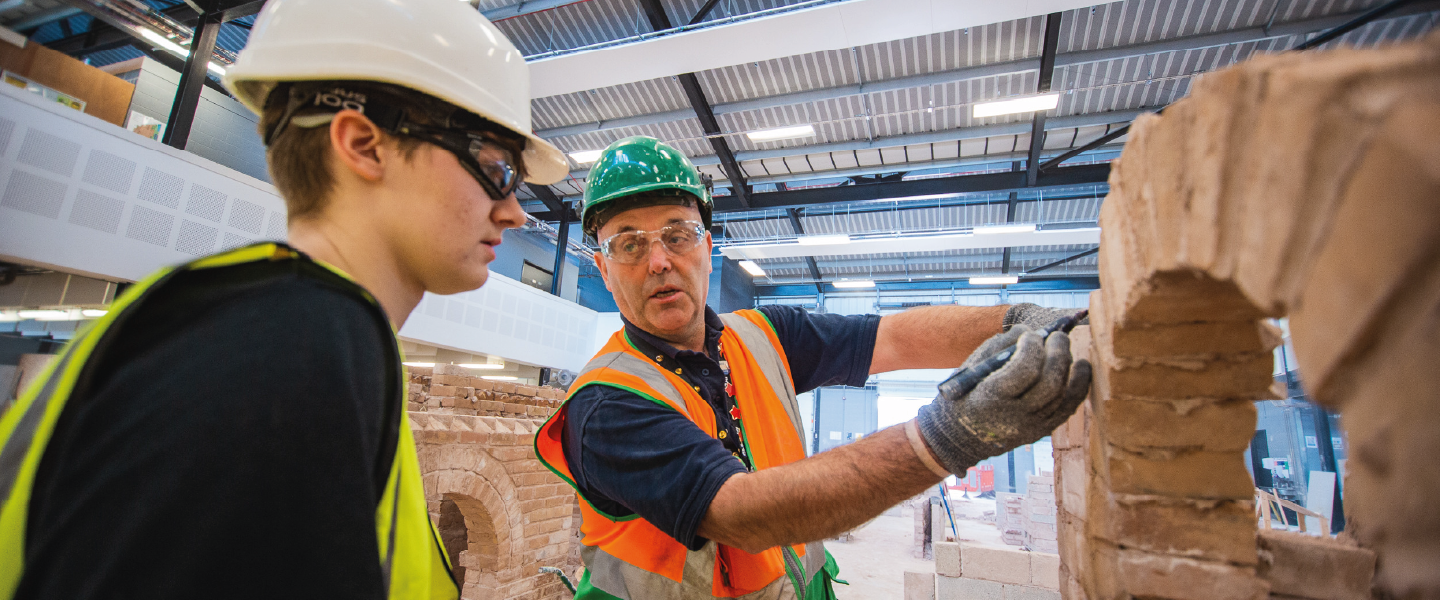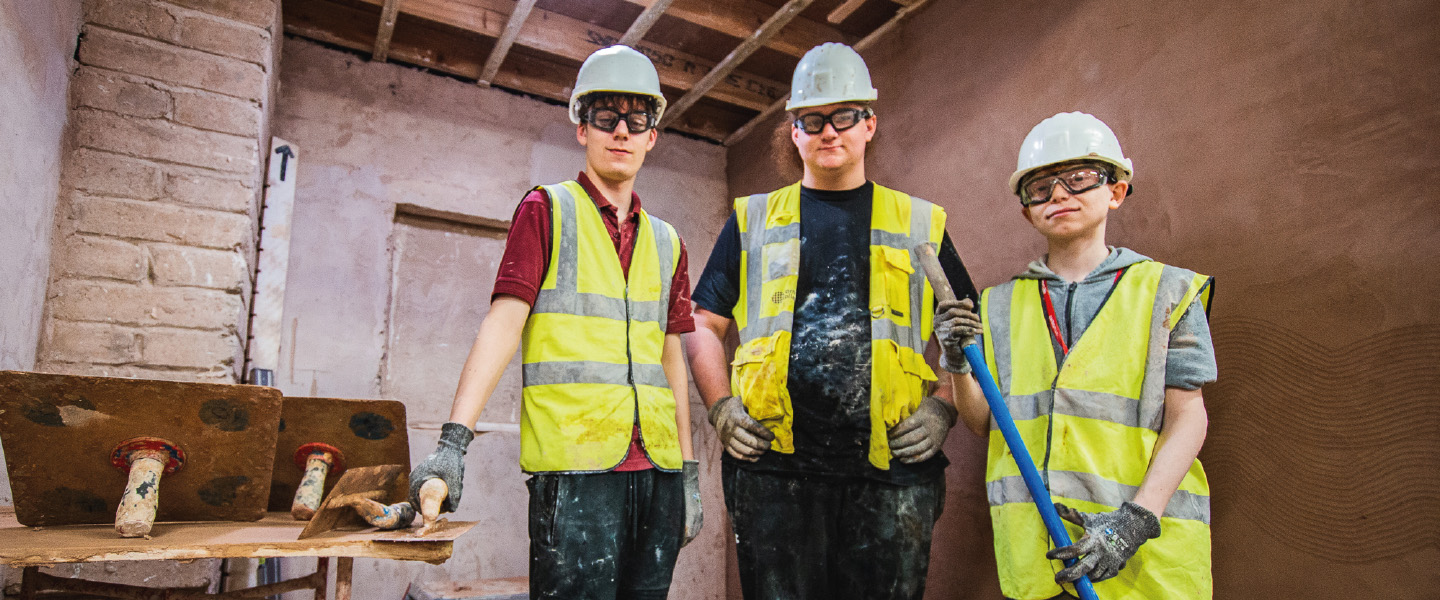You will be assessed by your assessor using a portfolio of evidence, practical demonstrations and assignments. You will be assessed both in college and in your place of work.



Apprenticeships can start at any time. This programme will take a 15 months to complete.
Level 3 advanced apprentices will progress from a level 2 apprenticeship, or be able to demonstrate the same knowledge, skills and competency levels.
Apprentices must achieve a Level 3 National Vocational Qualification (NVQ) to demonstrate competency in their chosen occupation.
Apprentices must complete, or have previously completed, recognised English and Mathematics Level 2 qualifications.
The occupation involves carrying out advanced skilled work, primarily using timber products, either on a construction site, or in a workshop, creating and installing building components. The advanced carpenter and joiner is able to undertake complex job tasks, requiring high levels of practical skills and knowledge, in addition to managing their own work and leading small teams.
The main differences between a level 2 site carpenter / architectural joiner, and a level 3 advanced site carpenter / architectural joiner are that the advanced carpenter / joiner has responsibility for managing their own and other people’s work, as well as being required to complete complex and non-standard work. Examples of complex tasks include curved products, irregular joints and bespoke work.
This is a core and options apprenticeship, with two pathways:
Pathway 1: An Advanced Site Carpenter will normally work on a building site, or in domestic and commercial premises, preparing and installing complex and often bespoke building components e.g. high quality doors, shaped linings, staircases with turns, complex wall and floor units, erecting bespoke structural carpentry (inclined roofs and joists) and erecting complex roof structures (e.g. inclined roofs with hips, valleys and dormers).
Pathway 2: An Advanced Architectural Joiner will normally be employed in a workshop, producing complex building components by setting out, marking out and manufacturing bespoke architectural products (e.g. doors, windows, staircases with turns and panelling/cladding).
Click here for further information regarding the Standard Apprenticeship.
There are a number of mandatory and optional units
Mandatory Units
| Site | Architectural/Bench |
| Installing bespoke first fixing components in the workplace | Producing setting out details for routine bench/architectural joinery products in the workplace |
| Installing bespoke second fixing components in the workplace | Marking out details for routine bench/architectural joinery products in the workplace |
| Confirming work activities and resources for an occupational work area in the workplace | Manufacturing routine bench/architectural joinery products in the workplace |
| Developing and maintaining good occupational working relationships in the workplace | Confirming work activities and resources for an occupational work area in the workplace |
| Confirming the occupational method of work in the workplace | Developing and maintaining good occupational working relationships in the workplace |
| Setting up and using transportable cutting and shaping machines in the workplace | Confirming the occupational method of work in the workplace |
| Conforming to general health, safety and welfare in the workplace | Manufacturing bespoke bench/architectural joinery products in the workplace |
| Conforming to general health, safety and welfare in the workplace |
20 credits are required from one unit for Bench and 46 credits from 2 units for Site.
| Site | Architectural/Bench |
| Erecting structural carcassing components in the workplace (20) | Producing CAD setting of details in the workplace (30) |
| Maintaining non structural or structural components in the workplace (29) | Setting up and using fixing machinery in the workplace (24) |
| Erecting complex roof structure carcassing components in the workplace (26) | Producing setting out details for bespoke bench/architectural joinery products in the workplace (20) |
You will be assessed by your assessor using a portfolio of evidence, practical demonstrations and assignments. You will be assessed both in college and in your place of work.
You will be required to provide paper, writing materials, A4 ring binder file, extra wide dividers and clear plastic wallets.
Upon completion you could progress onto further study relating to your role or apply for job roles including:
There is no cost to being an apprentice. All costs associated with your apprenticeship, including the cost of training and your salary, will be paid by your employer.
For further information please contact our friendly Information Team on +44 (0)1226 216 123 or email info@barnsley.ac.uk
Barnsley College has a range of sports opportunities for all students to take part in, gain professional training and compete nationally and internationally. We also have a state-of-the-art fitness village, Honeywell Sports Village where students can make use of our fitness suite, spinning studio and classes for competitive rates. You don’t have to be studying sport to get involved in the Sports Academy.
Our Additional Learning Support team can provide you with the support you need. Please contact them on +44 (0)1226 216 769.
Having good English and Maths qualifications are important for most careers and we want to give you the help you need to succeed.
If you are aged 16 – 19 and don’t already have a grade C/4 or above in GCSE English and Maths they will automatically be included in your study programme. If you want to work towards higher grades in English and Maths we can help you do that too.
Need a higher level Maths qualification? We offer a Level 3 Mathematical Studies (Core Maths).
This can be added to your study programme.
If you need any further information, please contact our friendly Information Team.
Please note we reserve the right to change details without notice. We apologise for any inconvenience this may cause.